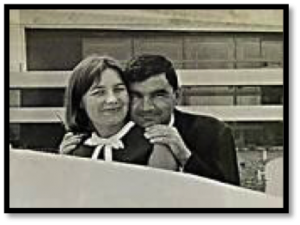Leonard Freed – Documentary Photographer! Exhibition at The City Gallery!
25 Books are in print, and the photos featured, are from BLACK IN WHITE AMERICA!
Leonard Freed was born in Brooklyn, New York to a working-class Jewish family. Freed discovered his passion for photography in 1953 while on a trip to Europe, and in 1956, moved to Amsterdam, where his career began. Working as a free-lance photographer, traveling the world, he established a name for himself as a documentary photographer, using the Leica camera. In 1956, he met Brigitte in Rome, and married. From that day forward, they were known as:
The Photographer and His Printer, Partners in Art and Love

In 1963, Leonard photographed an African American soldier at the Berlin Wall defending western civilization (See page 6 in Black in White America). Following, he and Brigitte returned to the United States to begin Freed’s documentation of the Civil Rights movement. Hundreds of his documentary photographs depict Martin Luther King, Jr. and many from the SCLC throughout their travels. He visited Johns Island, South Carolina in 1964 in route to Alabama. Freed also maintained a journal with him as he traveled, making notes as he went.
Brigitte while Leonard traveled, remained home and in her darkroom, where she mastered the art of printing black and white photographs, and also organizing the mass volume of his work. Today, she still maintains Leonard’s collections, in order and by date and location.
Leonard Freed’s photographs can be found in 25 books, of note:
Black in White America – Getty Publications, This is the Day (about the march on Washington – 8-28-1963) and then the 50th anniversary. POLICE Work, New York, 1980
Freed’s photographs are in collections at the Smithsonian Institute, Metropolitan Museum, New York, The Getty Museum, The High Museum, The Jewish Museum in New York and Berlin, and various European Museums and colleges and universities.
Brigitte Freed provided the documentary photographs on exhibit, on loan to the Gullah Society and A Backpack Journalist and The City Gallery and gifted the “Skelton” to the Gullah Society.

